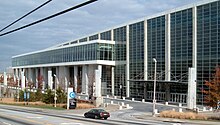
The men's épée was one of eight fencing events on the fencing at the 1964 Summer Olympics programme. It was the fourteenth appearance of the event. The competition was held from October 18 to 19 1964. 65 fencers from 25 nations competed. Each nation was limited to three fencers. The event was won by Grigory Kriss of the Soviet Union, the nation's first gold medal in the event after a bronze four years earlier. The Soviets also took bronze, with Guram Kostava finishing in third place. Between the two was silver medalist Bill Hoskyns of Great Britain; it was the second consecutive Games with a British silver medalist in the event. Italy's six-Games gold medal streak in the men's individual épée ended with the nation missing the podium entirely; Gianluigi Saccaro finished fourth after losing the bronze-medal barrage to Kostava.

The men's épée was a competition in fencing at the 2004 Summer Olympics in Athens. A total of 37 men from 21 nations competed in this event. Each nation was limited to 3 fencers. Competition took place in the Fencing Hall at the Helliniko Olympic Complex on August 17. The event was won by Marcel Fischer of Switzerland, the nation's first victory in the event and first medal of any color since 1952. Wang Lei's silver was China's first medal in the men's individual épée. Defending champion Pavel Kolobkov earned bronze, finishing a set of three different-colored Olympic medals in the event. Kolobkov was the fourth man to earn three medals in the event and had the best record of any of the four; only Ramón Fonst had more individual Olympic success in the men's épée. It was the fifth consecutive Games in which a Russian fencer reached the podium, including medals for Russian fencers competing for the Soviet Union (1988) and Unified Team (1992).

The men's sabre was a competition in fencing at the 2004 Summer Olympics in Athens. A total of 39 men from 21 nations competed in this event. Nations had been limited to three fencers each since 1928. Competition took place in the Fencing Hall at the Helliniko Olympic Complex on August 14. The event was won by Aldo Montano of Italy, the nation's first victory in the men's sabre since 1920. Montano accomplished what his grandfather and father, both world champions in the individual event and Olympic medalists in the team competition, had not been able to: Olympic gold in the individual event. Zsolt Nemcsik of Hungary took silver while Vladislav Tretiak earned Ukraine's first medal in the event with his bronze. France's five-Games medal streak ended.

The men's épée fencing competition at the 2008 Summer Olympics in Beijing took place on August 10 at the Olympic Green Convention Centre. There were 41 competitors from 23 nations. The event was won by Matteo Tagliariol of Italy, the nation's first victory in the event since 1960 and first medal of any color since 1968. It was Italy's seventh overall victory, most among nations. The silver medal went to Fabrice Jeannet of France. José Luis Abajo earned Spain's first men's individual épée medal with his bronze. The Russian fencers' streak of five Games on the podium ended.

The men's sabre fencing competition at the 2008 Summer Olympics in Beijing took place on August 12 at the Olympic Green Convention Centre. There were 40 competitors from 21 nations. The event was won by Zhong Man of China, the nation's first medal in the men's sabre. Nicolas Lopez's silver put France back on the podium after a one-Games absence. Mihai Covaliu of Romania became the 13th man to win multiple medals in the event, adding a bronze to his 2000 gold medal.
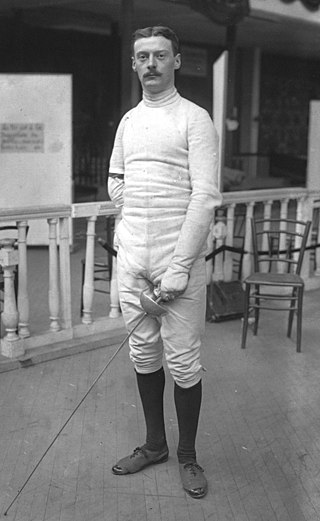
The men's épée was one of seven fencing events on the Fencing at the 1928 Summer Olympics programme. It was the seventh appearance of the event. The competition was held from 6 August 1928 to 7 August 1928. 59 fencers from 22 nations competed. Each nation could have up to three fencers. The event was won by Lucien Gaudin of France, the nation's third victory in the individual men's épée—taking sole possession of most among nations above Cuba and Belgium, each at two. Gaudin was the second man to win both the foil and épée events at a single Games. It was the third consecutive Games at which France reached the podium in the event. Two Frenchman had reached the head-to-head final; Gaudin won over Georges Buchard, who received silver. Bronze in 1928 went to American George Calnan, the nation's first medal in the event.
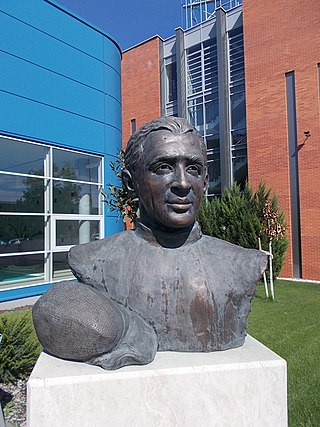
The men's épée was one of eight fencing events on the fencing at the 1972 Summer Olympics programme. It was the sixteenth appearance of the event. The competition was held from 4 to 6 September 1972. 71 fencers from 28 nations competed. Each nation was limited to three fencers. The event was won by Csaba Fenyvesi of Hungary, the nation's second consecutive victory in the event. His countryman Győző Kulcsár, the 1968 gold medalist, earned bronze this time to become the ninth man to win multiple medals in the men's individual épée. Silver went to Jacques Ladègaillerie of France; the French épéeists, a power in the event from 1900 to 1932, earned their first individual medal in 40 years. The three-Games podium streak of the Soviet Union was snapped, with all three Soviet fencers reaching the semifinals but eliminated there.

The men's épée was one of eight fencing events on the fencing at the 1980 Summer Olympics programme. It was the eighteenth appearance of the event. The competition was held from 27 to 28 July 1980. 42 fencers from 16 nations competed. Each nation was limited to 3 fencers. The event was won by Johan Harmenberg of Sweden, the nation's first victory in the event and first medal of any color in the men's individual épée since 1924. Silver went to Ernő Kolczonay of Hungary, extending the nation's podium streak to four Games despite the retirement of three-time medalist Győző Kulcsár. Philippe Riboud of France took bronze. Sweden's Rolf Edling, a two-time World Champion, made his third final in the event, but once again missed the podium.
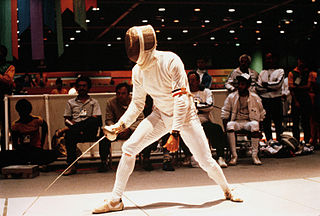
The men's épée was one of eight fencing events on the fencing at the 1984 Summer Olympics programme. It was the nineteenth appearance of the event. The competition was held from 7 to 8 August 1984. 63 fencers from 26 nations competed. Each nation was limited to 3 fencers. The event was won by Philippe Boisse of France, the nation's first victory in the men's individual épée since 1928 and fourth overall. France also took bronze, with Philippe Riboud winning the bronze medal match after losing to Boisse in the semifinals. It was Riboud's second consecutive bronze medal in the event, making him the 10th man to earn multiple medals in the individual épée. Silver went to Björne Väggö of Sweden. Hungary's four-Games podium streak in the event ended due to that nation joining the Soviet-led boycott.

The men's épée was one of ten fencing events on the fencing at the 2000 Summer Olympics programme. It was the twenty-third appearance of the event. The competition was held on 16 September 2000. 42 fencers from 22 nations competed. Each nation was limited to three fencers. The event was won by Pavel Kolobkov of Russia, the nation's second consecutive victory in the men's individual épée. Russia joined a five-way tie for third-most gold medals in the event at two. Kolobkov, who had a silver medal in 1992 representing the Unified Team, was the 11th man to win multiple medals in the event. France's Hugues Obry took silver in Sydney, returning France to the podium after a one-Games absence snapped a four-Games medal streak. Lee Sang-ki earned South Korea's first medal in the event with his bronze.
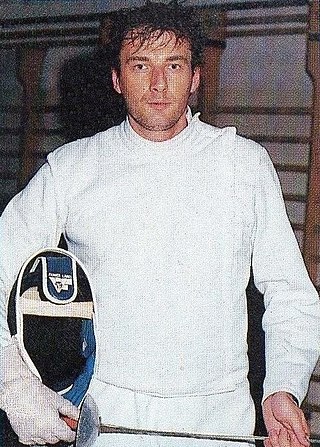
The men's sabre was one of eight fencing events on the fencing at the 1988 Summer Olympics programme. It was the twenty-first appearance of the event. The competition was held from 22 to 23 September 1988. 40 fencers from 18 nations competed. Nations had been limited to three fencers each since 1928. The event was won by defending champion Jean-François Lamour of France, the fourth man to successfully defend an Olympic title in the sabre and the 11th man overall to win multiple medals in the event. It was France's third victory in the event, matching the Soviet Union for second-most all-time. Janusz Olech took silver, Poland's first medal in the event since 1968. Italian Giovanni Scalzo earned bronze.

The men's épée was one of eight fencing events on the fencing at the 1992 Summer Olympics programme. It was the twenty-first appearance of the event. The competition was held on 1 August 1992. 70 fencers from 30 nations competed. Each nation was limited to three fencers. The event was won by Éric Srecki of France, the nation's fifth victory in the event. France also took bronze, with Jean-Michel Henry winning the bronze medal match. France's podium streak in the event extended to four Games. Pavel Kolobkov of the Unified Team took silver.

The men's foil was one of ten fencing events on the fencing at the 1996 Summer Olympics programme. It was the twenty-second appearance of the event. The competition was held on 22 July 1996. 45 fencers from 19 nations competed. Nations had been limited to three fencers each since 1928. The event was won by Alessandro Puccini of Italy, the nation's eighth victory in the men's foil. France took the other two medals, with Lionel Plumenail earning silver and Franck Boidin winning the bronze medal match.

The men's sabre was one of ten fencing events on the fencing at the 1996 Summer Olympics programme. It was the twenty-third appearance of the event. The competition was held on July 21, 1996. 43 fencers from 20 nations competed. Nations had been limited to three fencers each since 1928. The event was won by Stanislav Pozdnyakov, prevailing over silver medalist Sergey Sharikov in an all-Russia final. The medals were the first for Russia as an independent nation, separate from the Soviet Union, in the men's sabre. Damien Touya of France won the bronze medal bout, extending France's podium streak to four Games.

The men's foil was one of ten fencing events on the fencing at the 2000 Summer Olympics programme. It was the twenty-third appearance of the event. The competition was held on 20 September 2000. 40 fencers from 22 nations competed. Nations had been limited to three fencers each since 1928. The event was won by Kim Yeong-Ho of South Korea, the first Asian man to win an Olympic fencing title. Ralf Bißdorf of Germany took silver, the first medal for united Germany since 1928. Dmitry Shevchenko's bronze medal was Russia's first as an independent nation in the event.

The men's sabre was one of ten fencing events on the fencing at the 2000 Summer Olympics programme. It was the twenty-fourth appearance of the event. The competition was held on 21 September 2000. 39 fencers from 20 nations competed. Nations had been limited to three fencers each since 1928. The event was won by Mihai Covaliu of Romania, the nation's first medal in the men's sabre. Mathieu Gourdain's silver extended France's podium streak in the event to five Games. Germany also earned its first medal in the men's sabre, with Wiradech Kothny's bronze.

The men's épée competition in fencing at the 2012 Summer Olympics in London was held on 1 August at the ExCeL London Exhibition Centre. There were 30 competitors from 24 nations. Rubén Limardo of Venezuela won the gold medal – the country's only medal of the 2012 Games as well as the country's first medal in men's individual épée. Norway's Bartosz Piasecki won silver and Jung Jin-Sun from South Korea took bronze.

The men's foil competition in fencing at the 2012 Olympic Games in London was held on 31 July at the ExCeL London Exhibition Centre. There were 38 competitors from 20 nations. Lei Sheng of China won the gold medal, beating Alaaeldin Abouelkassem from Egypt in the final. It was the first medal in the individual men's foil for each of those nations. Choi Byung-chul of South Korea took bronze. The 2012 podium was the first time since 1904 that no European fencer won a medal in the event.
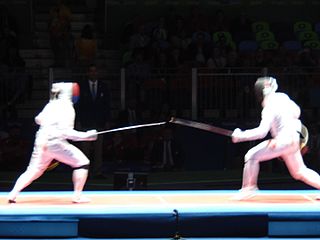
The men's épée competition in fencing at the 2016 Summer Olympics in Rio de Janeiro was held on 9 August at the Carioca Arena 3. There were 38 competitors from 20 nations. South Korea's Park Sang-young won the individual gold, the first victory for South Korea in the event after bronze medals in 2000 and 2012. Géza Imre took silver, Hungary's first medal in the event since 1996. Imre, at age 41, was the oldest individual fencing medalist since 1952. Gauthier Grumier of France earned bronze.

The men's team épée event at the 2020 Summer Olympics took place on 30 July 2021 at the Makuhari Messe. 27 fencers from 9 nations competed. The competition was won by Japan, with Russian Olympic athletes taking silver and South Korea bronze. The previous medal of Russia in men's team épée was in 1996; Japan and South Korea never medaled in this event. The 2016 champions and silver medalist, Italy and France, did not make it to the semifinals, the bronze medalist, Hungary, did not quality for the Olympics.
